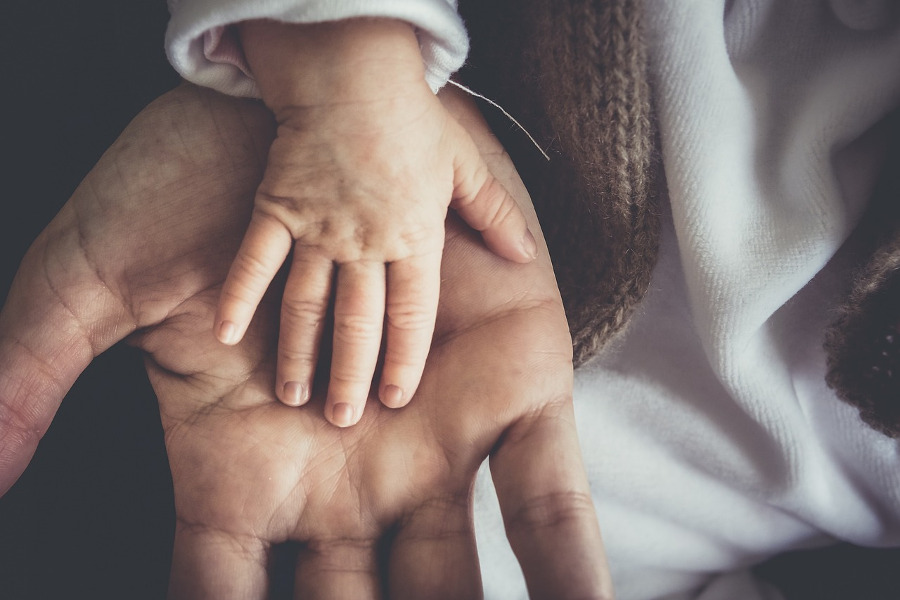

By: Ruqaya’s Bookshelf
Source: Ruqaya’s Bookshelf
If you are the kind of parent that I am, you’ll understand what it means to watch your child as she sleeps and wonder – What will happen to you if I die?
It might sound extreme (and it is), but we are the worriers; the ones who think of every possible outcome for every possible scenario. The ones who sit up at night thinking of all the things we should do to prepare for the “inevitable.” However, this tendency can be emotionally draining and harmful to our own mental health. And so, Allah Most High, the All-Knowing Creator that He is, knows our fears and addresses them straight on.
Whether you are a terminally ill parent struggling with the idea of your child losing you, a single-parent with no “back up” parent to speak of, or just a parent who worries about the well-being of your child, Allah Most High comforts you through His words and the words of His messenger…
In a hadith reported by Abdullah ibn Abbas (Allah be pleased with him), who was just a boy at the time, the Prophet Muhammad (ﷺ) said: “O young man, I shall teach you some words [of advice]: be mindful of Allah and Allah will protect you. Be mindful of Allah and you will find Him in front of you. If you ask, then ask Allah; and if you seek help, then seek help from Allah…”
The Prophet is advising this young companion to be mindful of Allah. In the original Arabic of this hadith, he uses the phrase “ihfadh-Allah, yahfadhak,” which literally translates as: “Take care of Allah, and Allah will take care of you.” What is meant by this phrase is that we should take care of the commandments Allah Most High has ordered upon us (i.e. our prayer, fasting, charity, character, dress-code, etc.). We should constantly be mindful of God and make the hereafter a priority in our lives.
And we get something beautiful in return: a promise from God that He will take care of us in a beautifully holistic way: He will care for matters of our worldly needs, our faith and our hereafter.
Even our children are included in this. Umar ibn Abdul Aziz once said, “There is not a single righteous believer who dies except that Allah Most High will protect his children and his children’s children.”
The story of Musa and Al-Khidr in Surat-Al-Kahf is a prime example of this concept. When these two men were journeying together, they came to a town where the people were not at all hospitable. Then, Al-Khidr saw a wall that was crumbling, and he fixed it. When Musa questioned Al-Khidr about this and asserted that he should have asked the townspeople for payment to do this work, Al-Khidr rebuked Musa for his lack of patience and explained his reasoning for fixing the wall:
“And as for the wall, it belonged to two orphan boys in the town; and there was under it a treasure belonging to them; and their father was a righteous man, and your Lord intended that they should attain their age of full strength and take out their treasure as a mercy from your Lord. And I did it not of my own accord. That is the interpretation of those (things) over which you could not have patience” (18:82).
Allah Most High sent Al-Khidr to protect the wealth of these orphans without anyone else’s knowledge or invitation for one reason only: their father was a righteous man. Had he not come along and fixed the crumbling wall, the orphans’ wealth would have been found by the townspeople and unlawfully seized.
Their father took care of the commandments of Allah, worshiping none but Him and leading a life of righteousness. So, Allah Most High, in turn, not only took care of this man, but also took care of his children even after he was no longer present.
You have no control over when you will die or become unable to care for your children due to illness or other circumstances. None of this is in your control. Some parents may even use their worrying as an excuse to do something against the faith, like opening interest-based savings accounts for their children. They mistakenly believe that this wealth will be the saving grace of the children if anything happens to the parents.
This isn’t to say that you shouldn’t prepare good resources for your children in the case that you can no longer provide for them. The orphans’ treasure was buried underneath that wall, wasn’t it? Someone clearly planned and buried it there. But plan and save and care for your children’s future in a lawful way, and Allah Most High will bless and protect them.
As parents, we sometimes focus on our children to the point where we almost lose our sense of self and our drive to do what is best for our own salvation. We need to refocus. We need to pry our eyes away from the goal of being “great parents,” and set our sights on becoming “great believers.” (And a great believer will also inherently become a great parent.)
The energy you use for excessive worrying about your children should be redirected and re-framed into an anxiousness to fulfill the commandments of Allah. And if the day comes sooner than you expect when Allah Most High decides that your life in this world must end, rest assured that He has promised to take care of you and your children.
And Allah Most High never breaks His promises.



